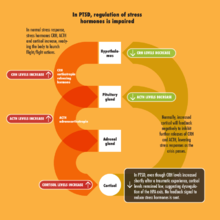What is stress?
Stress is our physical, psychological, and behavioral reactions to situations and demands that undermine our natural homeostasis, which may last for minutes or years. It is automatic, immediate, and generalized.
Stressful situations may have occurred in the past, very recently, or simply anticipated. They may be situations that everyone considers stressful - losing a job or a loved one - or one that you find stressful but your neighbor finds thrilling, such as climbing Mount Everest or getting married.
In fact, according to Hans Selye, Canadian stress expert, any “demand” made upon the body may cause a stress response. These demands can be a real or imaginary threat, a challenge, or any kind of change that requires the body to adapt.
Walter B. Cannon, an early 20th-century scientist, coined the physiological reaction of the body to stress as “the fight-or-flight reaction”. It means when we are exposed to a potentially threatening situation, the body almost immediately goes on high alert in preparation to either fight off the potential threat or avoid it through flight.
What is trauma?
Trauma is any unexpected situation that causes a strong subjective experience of intense fear, helplessness, bodily injury, or involves witnessing the death or injury of someone else.
Some common traumas include: car accidents, plane crashes, boating accidents, natural disasters (tornadoes, hurricanes, volcanic eruptions), robberies, muggings, shootings, physical assault and rape, hostage situations, terrorist attacks, kidnappings, military combat, domestic violence and child abuse.
What causes trauma?
One of the central difficulties in studying and understanding trauma is its subjective nature. In even the most horrific circumstances, a certain number of people will not suffer long term emotional effects. On the other hand, a child can be traumatized by witnessing a parental argument, especially if it is violent or happens on an ongoing basis.
So what makes an event traumatic?
In the case of war, soldiers face immeasurable hardship in combat situations, including hunger, hypothermia, sleep deprivation, and prolonged separation from friends and loved ones. However, all of these factors, when taken out of the context of war, generally do not cause lasting psychological damage.
Another possibility is the carnage they witness. However, research shows that civilians in England and Germany, who faced brutal bombing campaigns in WWII and witnessed tremendous carnage, experienced only a slight increase in psychological disorders as a result. Hence, carnage is also not a sufficient cause of trauma in itself.
According to the American Psychiatric Association, post-traumatic stress “...may be especially severe when the stressor is of human design.”
It has been suggested that a common element of events that cause lasting psychological damage is the experience of direct and open hostility or brutality between people…
“More than anything else in life, it is the intentional, overt human hostility and aggression that assaults the self-image, sense of control, and ultimately, the mental and physical health of human beings,” psychologist Lieutenant Colonel Dave Grossman wrote in his research paper.
English and German civilians in WWII did not experience the expected psychological damage because bombs falling from the sky are disassociated from the individuals dropping them. The aviators were spared emotional damage as well. Being separated from their victims by several thousand feet sheltered them from witnessing the consequences of their own actions.
In his book Men Against Fire, General S.L.A Marshall describes insights gleaned from interviews with soldiers after WWII. He discovered that only 15 to 20% of individual riflemen had fired their weapons at an exposed enemy soldier, concluding that human beings have an innate resistance to killing a member of their own species.
Another factor that may contribute to long term psychological difficulty is the presence or absence of a support structure following the traumatic event.
For example, vietnam veterans returned home to find unprecedented hostility from their own community, denying them the support they needed to recover from the trauma. Since the end of that war, there has been an estimated 1.5 million cases of post-traumatic stress disorder among Vietnam veterans, and suicide has claimed three times as many lives as the actual combat.
Of course, not all traumas come from direct human-to human brutality. The sudden loss of a loved one to illness or accident is also traumatic.
Traumatic experiences almost always involve the element of unpredictability and a sense that things are out of control. Even though the loss of a family member is always difficult to bear, a sudden death is more traumatic than one that is anticipated and prepared for.
Regardless of the cause, it seems that all traumatic experiences involve damages to the emotional being and social fabric. Either our faith in humanity is weakened or destroyed, or our sense of security, wholeness, familiarity, dignity, or integrity is broken, or our confidence in ourselves and our world is changed.




